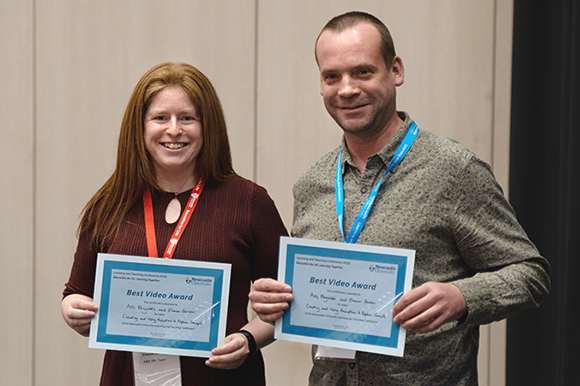A showcase of some of our work from 2021 and our submissions to the Learning and Teaching Conference 2022.
The FMS TEL team have collaborated on a wide range of projects throughout 2021, some of which we have submitted to the internal Learning and Teaching Conference 2022.
Adopting a flexible approach to professional written exams during COVID
Staff from the School of Dental Sciences and FMS-TEL have collaborated throughout the pandemic to ensure summative assessments continue in a robust fashion to satisfy regulatory requirements. This required a flexible approach to online assessment which continues to be important as the uncertainty continues. This presentation details the challenges we have faced and solutions we have utilised, offering practical advice for those who may wish to run online exams in the future on any platform.
Sarah Rolland and Luisa Wakeling, School of Dental Sciences
Audio Commentary and Structured Asynchronous Teaching of Communication Skills in Dietetics and Nutrition
Role-play and peer observation are widely used as educational methods for teaching communication skills in healthcare education, which has become a greater challenge to implement during the pandemic. In the context of dietetics and nutrition, our students developed communication skills using innovative audio resources. This video will discuss student voice survey findings regarding engagement and quality perceptions of the resources, and advise those wishing to create similar tasks, including task setup and technical support.
Susan Lennie, Biomedical, Nutritional and Sport Sciences
Can Scaffolding help Reflective Practice?
This workshop sets out the aims of incorporating reflective practice with scaffolded approaches in your teaching contexts and invites you to explore their potential value in your programmes or modules. Structured reflective templates are one of the key developments of the new NU Reflect system, which are currently being piloted. This session will also offer case studies to demonstrate how colleagues have implemented reflective templates to support the student reflective process within their contexts.
Patrick Rosenkranz, Simon Cotterill, Sam Flowers, David Gillies, David Teasdale
Content Evolution
A brief look at the FMS bespoke VLE Ngage, and its special features which were designed for our distance learning programmes. This session will cover how we migrated our content into Canvas without losing functionality and the challenges we encountered. We will also discuss how the content has evolved during the pandemic and the changes made to enhance the student experience.
Emily Smith, FMS TEL
Creating and Using Animations to Explain Concepts
This video demonstrates a how animations can be used to demonstrate concepts in teaching. It showcases advanced animations that are used to show complex concepts and allow for dynamic and interactive content to be shared on screen. Should you not have access to high-end software, the video also shows what can be achieved using PowerPoint animations and shows some tools that can be used to develop understanding beyond static diagrams or simple videos.
Ashley Reynolds, FMS TEL
Designing Convertible Teaching
This workshop provides colleagues with practical tips on how to design teaching that can be converted between online and offline, and synchronous and asynchronous delivery styles with minimal effort. Participants will think through resource design using examples, and apply this knowledge to their own resources brought to the session. Participants will take away technological shortcuts that reduce the burden when changing delivery styles, as well as an understanding of how to design inherently flexible resources.
Eleanor Gordon, FMS TEL
Exploring 3D Anatomy: Collaborative Development of an Inclusive Online Course Supporting Universal Enhancement of Transferable Observational Skills
This talk covers the development of a MOOC which develops students’ skills in 3D Spatial Awareness in the context of the study of anatomy. This collaboration between Newcastle University and the University of Cape Town focuses on specific art-based and technology enhanced learning exercises to develop skills that will enhance students’ capabilities in clinical observation, diagnosis, and surgical training. Prior research and development of specific observation methodologies, their deployment in an online environment, and students’ learning outcomes will be shared.
Iain Keenan, School of Medical Education
Flipping case-based learning online in response to the pandemic
This presentation shares practice from rapid changes made to ‘flip’ learning and teaching in MB BS, in response to the pandemic. This is in the context of a new Clinical Decision Making course, originally designed to use online cases to supplement primarily face-to-face learning and teaching in both UK and NuMed. The pandemic gave need to rapidly shift to predominantly online delivery with more asynchronous delivery. We will demonstrate adaptions made and discuss lessons learned.
John Moss, David Kennedy, Dan Plummer
Staff development: collaboration across continents for using TEL
A study across campuses of Newcastle University into perceptions of TEL use found that staff in the NUMed and Singapore campuses felt they lagged behind in training for using TEL. The FMSTEL team responded with an online conference, collaborating with NUMed, at a time accessible to all. Various topics included specific technologies and embedding online transnational cross-campus teaching in the curriculum. Successful, it may become an annual event.
Alison Clapp, David Kennedy, Ruth Valentine, John Moss and Bhavani Veasuvalingam, FMS and NUMed
Using Canvas Commons to Supply and Support Student Learning Opportunities
What is Canvas Commons, how does it work, and why is it useful for disseminating online learning material? I will present examples of tutorials I have shared and induction material. By using Commons we can promote our material and the University to the wider Canvas Community. This will address the theme of Changing Practice through the Pandemic by focusing on the use of Canvas to provide excellent learning opportunities.
Michelle Miller, FMS TEL



